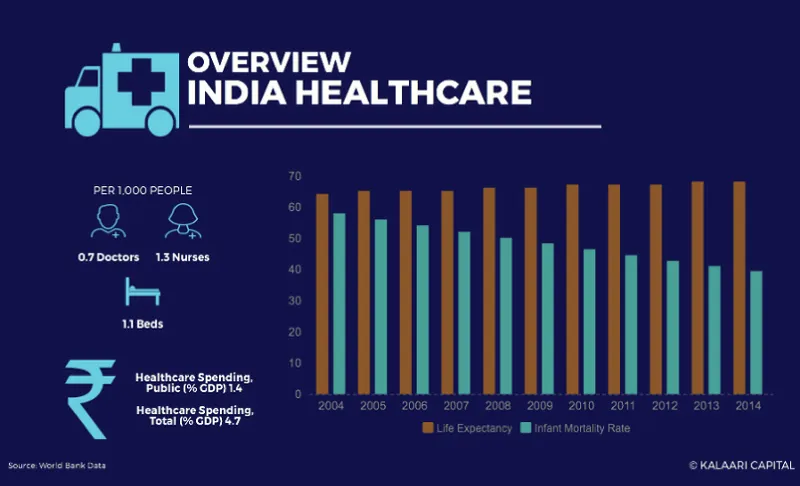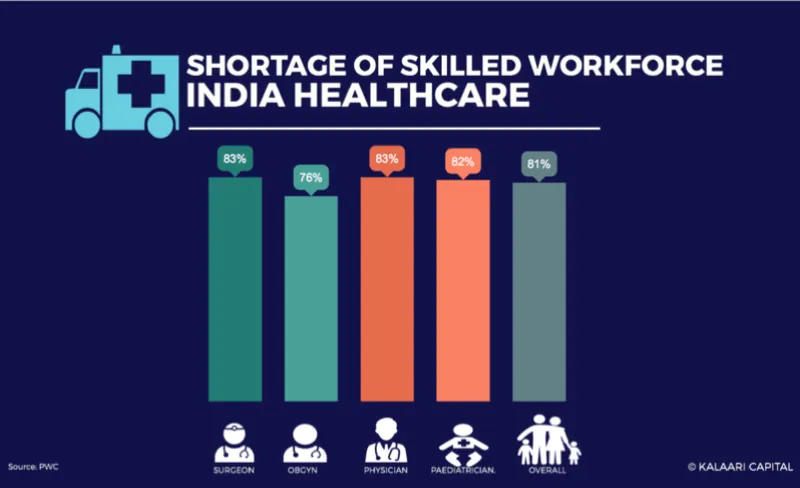“No power on earth can stop an idea whose time has come” said Dr. Manmohan Singh, the then Finance Minister, recalling Victor Hugo as he unveiled economic liberalization plan for India in 1991. Since then India’s GDP has grown at an average of about 7% for the next 3 decades and is poised to becoming the 3rd largest economy in the world by 2030. Despite this phenomenal growth, healthcare is one sector that lagged significantly behind.

A Healthy Economy
The correlation between the health of a country and its effects on economy is well documented. An improvement in the quality and delivery of healthcare not only enhances people’s quality of life but also improves the productivity and facilitates faster economic development.

In 2014, according to World Bank data, India’s public spending on healthcare was a mere 1.4% of its GDP. Compare that with China’s 3.1% and United States’ 8.3%. India today has just 0.7 doctors and 1.1 beds for every 1,000 of its citizens.
However, after taking into consideration the private sector participation India’s total healthcare spending stands at 4.7 % of the GDP. This should come as no surprise because private sector accounts for 74% of total healthcare spending in the country. But, when you compare that with China’s 5.5% of GDP and USA’s 17% of GDP it becomes clear that India must play catch-up in order to provide affordable and quality healthcare to its people.

Things are about to change. In its 12th five year plan, Govt. of India is expected to have spent $55 billion or 2.5% of GDP on healthcare which is nearly a threefold increase from the previous period. Furthermore there is a significant increase in FDI inflows and heightened investor interest in the sector. Venture Capital and Private Equity funded transactions amounted to no less than $1.2 billion in 2016 alone. This is all the more encouraging given the lion’s share of healthcare spending is coming from the private sector.
Digital Opportunity
Healthcare market in India is poised to grow from $100 billion in 2016 to $280 billion in 2020. This explosive growth is enabled by broader and deeper penetration of broadband internet and smartphones. By some accounts, India is already world’s second largest smartphone market and the number of smartphone users is only growing at a breakneck CAGR of 20–30%. As more Indians get access to broadband internet and smartphones they are more likely to avail themselves of digital services. And healthcare is no exception to this.
Across the globe, digital startups are playing a crucial role by providing unprecedented access to healthcare services. Technologies such as Big Data, IoT, Artifical Intelligence (AI) and Machine Learning (ML) are finding applications in exciting new areas such as Digital Intervention, Data Aggregation & Analytics, and new age Insurance solutions. However, India’s digital health ecosystem is still in its nascent stages; EMR & EHR are not widely implemented, cyber security of healthcare data is still a relative unknown, Big Data in healthcare is still in its infancy, and preventive healthcare solutions are lacking necessary thrust.
Can digital health sector produce India’s next Unicorn? How are traditional healthcare providers preparing themselves for this digital future? What are Indians’ wellness needs and how are they evolving? On July 5, 2017 Kalaari Capital is co-hosting ‘BillionFit: Technology Redesigning Healthcare’ with Curefit, a leading fitness, and wellness solutions provider, to answer these pertinent questions. Our desire is to provide thought leadership for the startup ecosystem and generate deep insights about technology’s role in creating new opportunities in health and wellness.
As India embarks on its next phase of growth, digital startups could help revolutionize the healthcare sector. By leveraging technology and focusing on preventive healthcare we can reach the aspiration of #BillionFit more effectively. For a chance to get an invite to this exclusive event please enter your information here.
Acknowledging Karteek Pulapaka, a contributor to this article. Karteek is a Kstart fellow.
Note — Kalaari is an investor in Curefit. Kalaari or Kstart is not an investor in any other startups that may have been mentioned above
Disclaimer: It is strictly an independent opinion of the writer, not representative of Kstart or Kalaari.
(Disclaimer: The views and opinions expressed in this article are those of the author and do not necessarily reflect the views of YourStory.)







